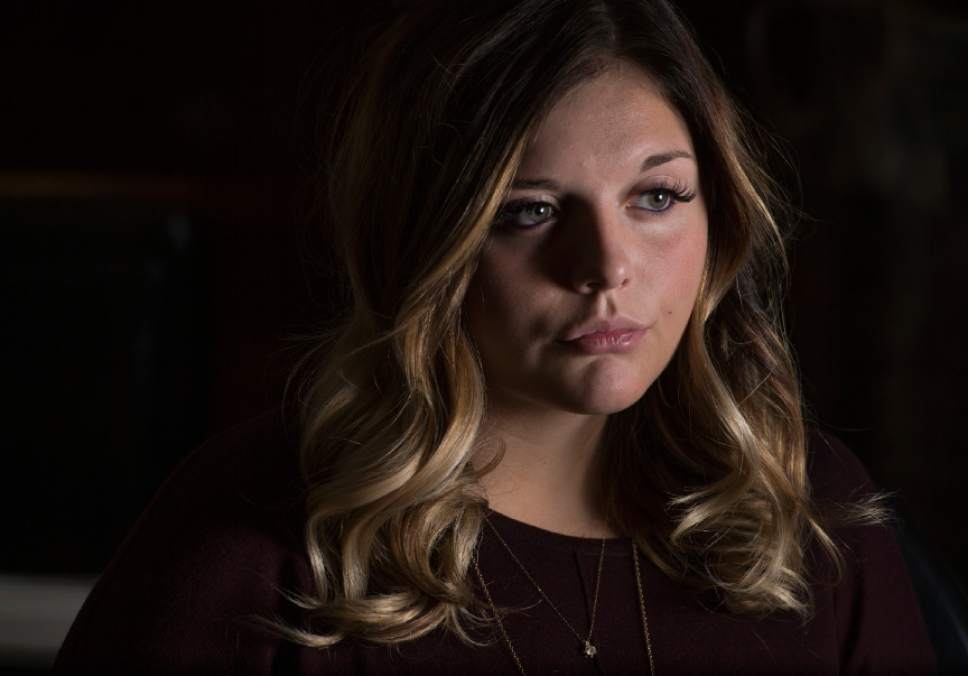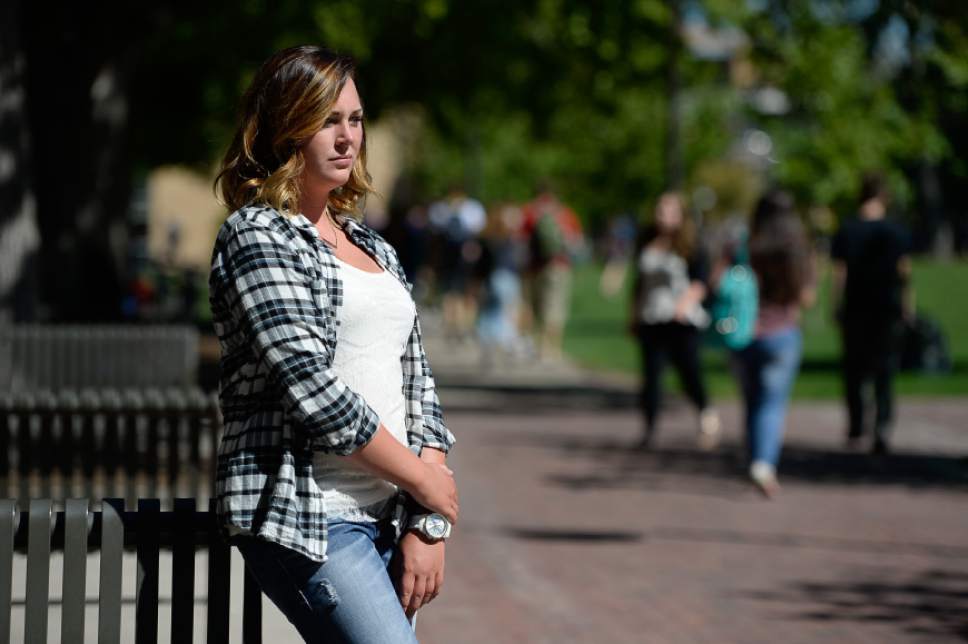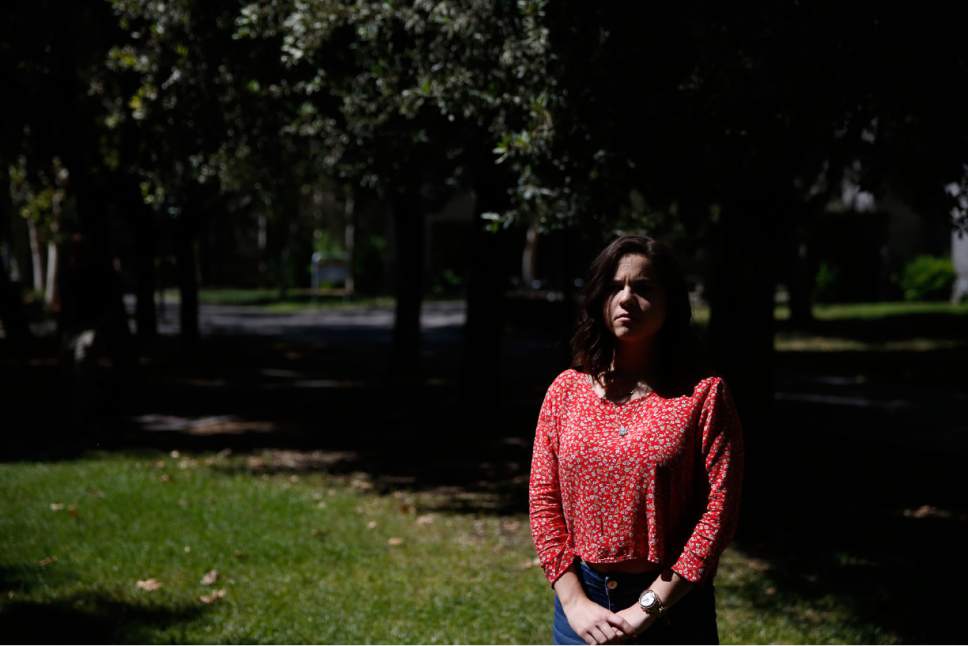This is an archived article that was published on sltrib.com in 2016, and information in the article may be outdated. It is provided only for personal research purposes and may not be reprinted.
At first, Utah State University student Morgan Klinkowski tried to forget the October 2014 night Jason Relopez raped her.
Relopez was popular, she said, and she was worried about being judged by her sorority sisters.
"I wanted nothing to do with any of it," she said. "I threw my clothes away, I cleaned the floor, and I tried to walk away the best I could."
But after an anxiety attack left her unconscious on a bathroom floor later that month, she sought help from the school's Sexual Assault and Anti-Violence Information office (SAAVI).
There, she felt "sick," she said, when she was told by a counselor that she was the fifth woman to allege being attacked by Relopez.
Under the federal law known as Title IX, universities that know a student might have sexually abused multiple students must investigate — even without a formal complaint.
But emails obtained by The Salt Lake Tribune through an open-records request show university officials were uncertain about how to handle the allegations. They eventually chose to talk to Relopez about consent, block him from one Greek event and warn him that he was on their radar. Though the four officials discussed other alleged victims, no mention is made of an investigation into Relopez's conduct.
Months later, Relopez raped Victoria Hewlett, another student.
Klinkowski hadn't gone to police after her own assault, disheartened by what she saw as the "slap on the wrist" Relopez got from USU. But after she heard about Hewlett's rape, she said, she "broke down and made the choice that I don't care anymore if no one believes me."
She filed a police report and Relopez was arrested. At that point, Utah State officials suspended Relopez.
He was sentenced in May to a year in jail for attempted rape and attempted forcible sex abuse. As part of his plea deal, he admitted sexually assaulting Klinkowski in 2014 and Hewlett in 2015.
The Tribune generally does not name sexual assault victims, but Klinkowski and Hewlett agreed to be identified.
Hewlett now is suing the university for not acting on the knowledge that Relopez was a danger.
Tim Vitale, USU spokesman, said in an email it was inappropriate to comment on the details of pending litigation.
"I would ask, as a matter of fairness, that people remember that a lawsuit filed in court only contains one part of the story," Vitale said. "We will get the chance to tell our side."
—
"You are on notice with us"
By the time three university officials met with Relopez in November 2014 about Klinkowski's report, they already were aware he had allegedly attacked other female students.
They had heard from an adviser for Klinkowski's sorority. She told Kevin Webb, the school's Greek adviser, that Relopez "has been verbally, emotionally and physically abusive" with other sorority members, according to emails later obtained by Logan police and released to The Tribune.
They also heard from Jenny Erazo, SAAVI coordinator. She said Relopez had sexually assaulted another student, according to minutes from the November meeting with Relopez.
"Jenny stated that she, Jenny, knows about Jason from yet another student," the document notes.
But in emails, school officials appeared to be unsure of how to proceed. They questioned who needed to know Klinkowski's name, if they should encourage other alleged victims to come forward and what the "proper course of action" was.
Klinkowski said she initially decided to make her report anonymously. In the email thread, Krystin Deschamps, the university's student conduct coordinator, said that meant the conversation with Relopez would be "more of a 'you are on notice with us, we are watching you, and you will be very sorry if you violate the Student Code in the future' kind of meeting."
Webb, Deschamps and Eric Olsen, associate vice president of student affairs, met with Relopez on Nov. 7, 2014, and he "denied that he ever had sex without consent," according to minutes from the meeting.
Relopez said he relied on body language to determine if a partner wanted to have sex. Asking would be "awkward," he said.
He then "chuckled" and asked, "What am I supposed to say? 'Do you want to have sex with me?' " the document states.
Deschamps told him yes, and the document further notes that school officials informed Relopez that nonconsensual sex was rape and that "the absence of a no does not mean yes."
Relopez was barred from attending the upcoming Greek Leadership Weekend and informed that "he was on USU's radar, and if we learned of any of the allegations being true, that he wouldn't be a student at USU anymore," according to the minutes.
In the emails sent before the meeting, Deschamps wrote, "We need to hear his side of the story, first, but I think banning him from [leadership weekend] attendance while we look into things is perfectly reasonable."
But according to records USU gave to Logan police — which had asked for "any disciplinary hearings, notes or other documents" concerning Relopez during the 2014-2015 school year — officials made no further attempt to discover whether any of the allegations were true.
Although Klinkowski had initially reported anonymously through SAAVI, Webb later learned her name, and she talked to him. Klinkowski said she told Webb she would move forward with a formal complaint if, after the interview with Relopez, he thought there was enough evidence to proceed.
She said Webb told her there wasn't — but the meeting minutes do not show that school officials questioned Relopez about any specific allegations.
"This is the wrong approach for university officials to take," said Carly Mee, attorney for SurvJustice, a nonprofit that provides legal assistance to survivors of sexual violence.
School officials should have questioned Relopez about Klinkowski's allegation, especially because they had knowledge of other alleged victims, Mee said.
By questioning him, they could have uncovered potential witnesses. They could have reached out to women in Klinkowski's sorority who previously reported problems with Relopez to see if anyone would be willing to speak, Mee said. They also could have talked to members of Relopez's fraternity.
Brett Sokolow, president and CEO of The National Center for Higher Education Risk Management, wrote in guidance for campuses that even if a student doesn't file a formal sexual assault complaint, the university's "duty to investigate the report is absolute. There are no exceptions."
Sokolow notes that schools cannot always uphold a victim's wish for confidentiality or anonymity when "the results of the investigation do not give you reasonable assurance as to the safety of your community."
A hearing can be initiated without the participation of the victim, he said, using witnesses as well as police and medical records, for example.
"No need to worry about [the Family Educational Rights and Privacy Act]," he wrote. "You have a right to use this information even without the alleged victim's consent, under the health and safety exception."
It appears USU didn't live up to its responsibilities, Mee said.
"It's such an irresponsible leap of faith to say, 'Well, we'll do something if you do it again' and send him back out there," Mee said. "We know what's going to happen."
—
"You know I'll win"
Eight months after the USU officials talked with Relopez, Hewlett was terrified.
Her face was stinging from Relopez's slap as he raped her at a July 2015 Sigma Chi party. Her mind focused on the guns rumored to be beneath his bed. She didn't dare fight: It was clear he was angry, she said, and she worried he would seriously hurt her.
The two had been making out in Relopez's bedroom, she told police, when he suddenly grabbed her by the shoulders and said, "You know I'll win tonight because I am stronger than you."
Relopez would go on to rape Hewlett four to six times that night, according to the police report and court hearings. He vacillated between asking if Hewlett was OK and choking her so hard she almost passed out.
At one point, Hewlett's friend — identified as O.S. in court documents — pounded on Relopez's bedroom door. Hewlett tried to persuade him to leave the room with her, she said, afraid of what would happen if she called out. Relopez refused, saying "he had been accused of rape in the past and it ruins lives," according to the police report.
Hewlett's lawsuit, filed Monday, alleges that O.S. asked the fraternity house manager for help when no one opened the door. The house manager refused, documents state, even though he had "knowledge that Relopez had sexually violent tendencies towards women."
By the time Hewlett could leave the Sigma Chi house that morning, her body was covered in what police later described as "severe" cuts, and had bruises on her neck, chest and arm.
Hewlett reported the assaults to police, and to Webb, about a week later. Two other women who heard about her report — including Klinkowski — then made reports against Relopez, who was arrested.
Klinkowski told police how her October 2014 homework session with Relopez had turned into a violent sexual assault. She described his change in demeanor right before he held her down on the couch and raped her: how his eyes glazed over, his face went blank, his ears seemed deaf to her protests.
S. Louise, the other woman who came forward to police, told them she jolted awake in Relopez's bed one night in the fall of 2014. The two had been drinking and she awoke to Relopez choking her while having sex with her, she said.
S. Louise — who asked to be identified by a partial name — said she awoke with Relopez several times after drinking and without a memory of what happened the previous night.
She had recently left Utah State, she said, and did not report to the school. She also didn't report to police immediately, she said, because she "didn't want to be the one person who came forward about it."
The Cache County Attorney's Office declined to file charges in her case "due to lack of evidence," according to the police report. She's still upset with this decision.
"It made me feel like they were justifying what he did to me," she said. "It was like mine's not a big deal because it was different than the others."
—
"I didn't feel safe"
Upon learning of Relopez's arrest, Utah State suspended him. James Morales, the school's vice president for student services, wrote, "Because the allegations are that you have assaulted multiple members of the university community, I believe you to be a danger to others."
Hewlett felt betrayed after learning that the school knew of multiple allegations against Relopez well before he assaulted her.
She left campus and dropped out of school.
"I think I just was scared," she said, "I didn't feel safe, and I didn't feel comfortable."
The protections in Title IX are supposed to help victims avoid that exact challenge and stay in classes.
While police and prosecutors focus on winning a conviction and securing a sentence, Title IX envisions school officials working in a parallel system. The law calls for them to investigate, preserve the civil rights of an accused student as well as an alleged victim, and weigh discipline.
They can provide victims counseling and help with coursework deadlines or housing changes so they stay in school.
When there are multiple allegations against a student, school officials can put an alleged perpetrator on notice and counsel him or her, even without a formal complaint.
And as they investigate, they can search for ways to make campus safer — such as providing increased supervision at places where misconduct occurred; training students and employees; alerting students to policies on sexual violence and conducting surveys about sexual violence.
Hewlett said she was not offered Title IX services or informed about the campus process.
"It didn't look like the university did anything," Hewlett said. "I had zero contact with anyone besides the Greek adviser."
Hewlett never returned to Utah State. After taking a year off from school, she transferred to Orem's Utah Valley University, where she is studying social work.
Klinkowski, however, eventually received help and is still studying at Utah State.
She was failing most of her classes as she struggled to cope after the assault. Erazo, the SAAVI coordinator, helped Klinkowski with some of her classes, she said, but after Relopez was sentenced in May, USU "bent over backwards" to help with her schoolwork. The school even returned money for courses that couldn't be saved, she added.
That same month, S. Louise left Logan and moved home. She didn't want to be part of a community that allowed these kinds of patterns to exist, she said.
Twitter: @alexdstuckey







